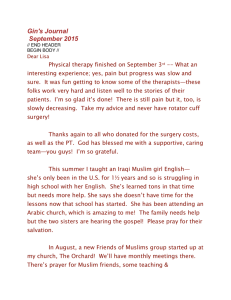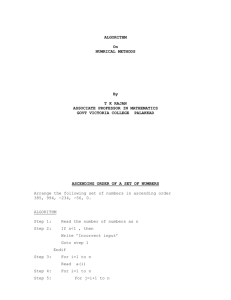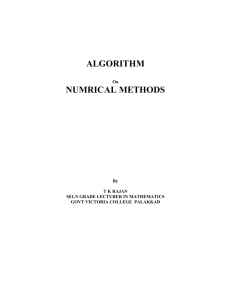University of Wisconsin at La Crosse Faculty/Staff Campus Climate Survey Report
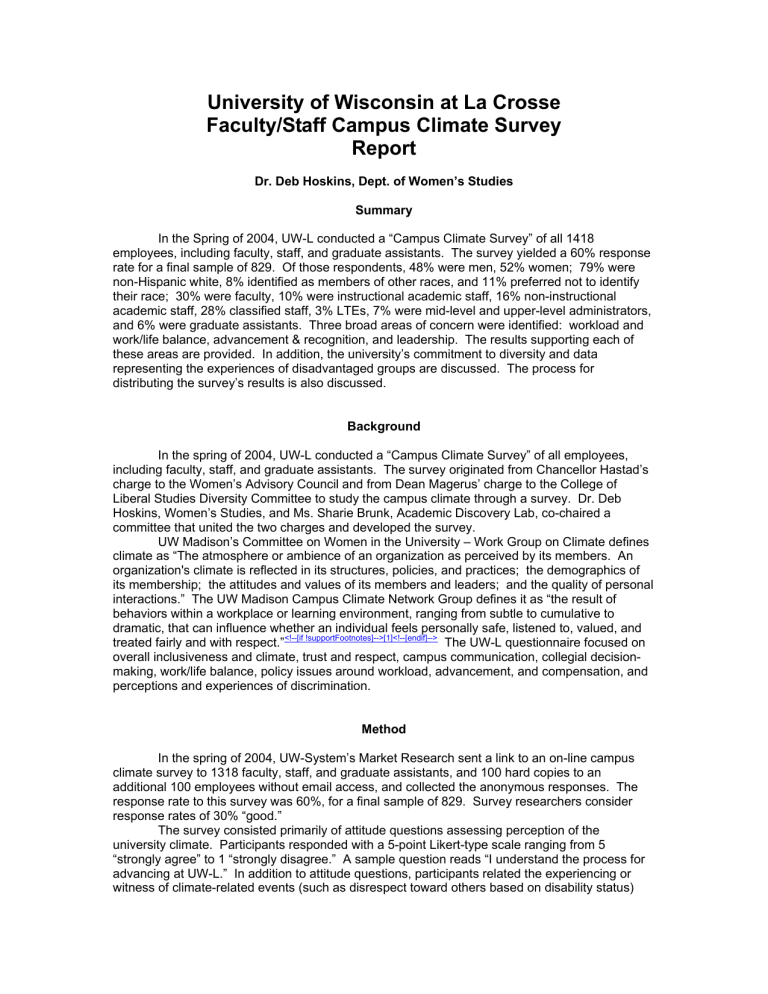
University of Wisconsin at La Crosse
Faculty/Staff Campus Climate Survey
Report
Dr. Deb Hoskins, Dept. of Women’s Studies
Summary
In the Spring of 2004, UW-L conducted a “Campus Climate Survey” of all 1418 employees, including faculty, staff, and graduate assistants. The survey yielded a 60% response rate for a final sample of 829. Of those respondents, 48% were men, 52% women; 79% were non-Hispanic white, 8% identified as members of other races, and 11% preferred not to identify their race; 30% were faculty, 10% were instructional academic staff, 16% non-instructional academic staff, 28% classified staff, 3% LTEs, 7% were mid-level and upper-level administrators, and 6% were graduate assistants. Three broad areas of concern were identified: workload and work/life balance, advancement & recognition, and leadership. The results supporting each of these areas are provided. In addition, the university’s commitment to diversity and data representing the experiences of disadvantaged groups are discussed. The process for distributing the survey’s results is also discussed.
Background
In the spring of 2004, UW-L conducted a “Campus Climate Survey” of all employees, including faculty, staff, and graduate assistants. The survey originated from Chancellor Hastad’s charge to the Women’s Advisory Council and from Dean Magerus’ charge to the College of
Liberal Studies Diversity Committee to study the campus climate through a survey. Dr. Deb
Hoskins, Women’s Studies, and Ms. Sharie Brunk, Academic Discovery Lab, co-chaired a committee that united the two charges and developed the survey.
UW Madison’s Committee on Women in the University – Work Group on Climate defines climate as “The atmosphere or ambience of an organization as perceived by its members. An organization's climate is reflected in its structures, policies, and practices; the demographics of its membership; the attitudes and values of its members and leaders; and the quality of personal interactions.” The UW Madison Campus Climate Network Group defines it as “the result of behaviors within a workplace or learning environment, ranging from subtle to cumulative to dramatic, that can influence whether an individual feels personally safe, listened to, valued, and treated fairly and with respect.”
<!--[if !supportFootnotes]-->[1]<!--[endif]-->
The UW-L questionnaire focused on overall inclusiveness and climate, trust and respect, campus communication, collegial decisionmaking, work/life balance, policy issues around workload, advancement, and compensation, and perceptions and experiences of discrimination.
Method
In the spring of 2004, UW-System’s Market Research sent a link to an on-line campus climate survey to 1318 faculty, staff, and graduate assistants, and 100 hard copies to an additional 100 employees without email access, and collected the anonymous responses. The response rate to this survey was 60%, for a final sample of 829. Survey researchers consider response rates of 30% “good.”
The survey consisted primarily of attitude questions assessing perception of the university climate. Participants responded with a 5-point Likert-type scale ranging from 5
“strongly agree” to 1 “strongly disagree.” A sample question reads “I understand the process for advancing at UW-L.” In addition to attitude questions, participants related the experiencing or witness of climate-related events (such as disrespect toward others based on disability status)
over the past year, and provided traditional demographic information. Two open-ended questions solicited suggestions to improve the campus climate. Two-hundred-forty respondents commented on the first question on historically-excluded populations for a response rate of 29%.
Three-hundred-forty-one respondents commented on the second question, on the individual’s own situation, for a response rate of 41%.
Analysis
System Market Research conducted the initial analysis, largely comprised of descriptive statistics indicating the percent of the participants responding to each response option per item
(weighted by gender
<!--[if !supportFootnotes]-->[2]<!--[endif]-->
). For instance, in response to the question “I understand the process for advancing at UW-L,” 10% of the respondents strongly agreed, 45% agreed, 14% were neutral, 17% disagreed, 7% strongly disagreed, and an additional 7% were
“unable to judge”, The System Market Research report is attached here as Appendix A.
In order to identify the areas of concern, a criteria was established. Survey researchers traditionally employ a 10% rule: 10% of a population needs to mention a topic (in response to open-ended questions) to justify pursuing additional analyses. This report used a more conservative criteria, considering any survey question problematic if System Market Research’s report indicated that at least 20% of the sample responded negatively. Negative response was defined as indicating an attitude of “disagree” or “strongly disagree” to an attitudinal item.
Although the standard of 20% could be debated, it is merely a device to identify the most problematic areas. Ms. Sharie Brunk analyzed the 581 written responses to the survey’s two open-ended questions by identifying common themes. Where applicable, results from the openended questions are provided along with the statistical analyses.
In addition, the raw data, excluding the responses to the open-ended questions, were provided to Dr. Carmen Wilson, Dept. of Psychology, who conducted additional analyses to identify differences among subgroups (not weighted for gender). The primary analyses consisted of analysis of variance (ANOVA - a statistical test that assesses differences on an interval level variable between two or more independent groups by comparing the means and standard deviation of each group). In addition, if differences among three or more groups were found, a statistical test was performed to indicate which groups differed significantly from one another
(Student-Newman-Keuls). Dr. Wilson’s results are attached as Appendix B.
Results that cut broadly across campus constituents: workload and work/life balance, advancement and recognition, and leadership. Each area is discussed separately below.
Using the 20% standard described above, three major themes arose as problem areas
Respondents’ perceptions of UW-L’s commitment to inclusiveness arose as a fourth area of concern, although it was less widespread than the three above.
Finally, the experiences of historically-disadvantaged populations (including employees of color, LBGT employees, and employees with documented disabilities) constitute a fifth set of concerns.
Workload and the Work/Life Balance
Survey questions centering on workload and the balance between work and personal life received the greatest number of negative responses, making it the largest area of campus-wide concern. A substantial number of UW-L employees (26%) are dissatisfied with the balance between their work lives with their personal lives. Listed below are the items assessing workload
and work/life balance identified as problematic. Ten out of fourteen items were responded to negatively at a rate of 20% or more.
Proportion of respondents indicating “Disagree” or “Strongly Disagree” to survey items:
47% The work load is fairly distributed at UW-L.
32% My classification/rank is appropriate to my job assignments and work load.
28% My work assignment is doable within the time I have to do it.
27% The time pressures of my job are reasonable.
26% I am satisfied with the balance between my personal life and my job.
24% I believe that I can both care for a family and advance at work.
24% I know where to get information about UW-L’s work/life policies.
22% I feel free to “speak-up” about work/life issues at UW-L.
21% My opportunities for advancement at work are hindered by my responsibilities and activities outside of work. [Wording of this question makes the “agree” side the indicator of a problem. 21% responded “agree” or “strongly agree”.)
20% UW-L’s senior administrators respect the need to balance work and life roles.
Subgroup Analyses:
<!--[if !supportLists]-->
<!--[endif]-->Graduate assistants were more positive than any other category of employee (administrators, faculty and instructional academic staff, or non-instructional academic staff, classified staff, and LTEs) in their perceptions of workload.
<!--[if !supportLists]-->
<!--[endif]-->Faculty and instructional staff saw more work/life balance issues more negatively than administrators.
<!--[if !supportLists]-->
<!--[endif]-->Gender alone made no difference either on workload or work/life balance questions.
<!--[if !supportLists]-->
<!--[endif]-->Single wage-earners saw work/life balance issues more negatively than did employees with more than one wage-earner in their household; the number of dependents made no difference.
<!--[if !supportLists]-->
<!--[endif]-->Lesbians, gays, and bisexuals saw work/life balance issues more negatively than did heterosexuals and also perceive workload issues more negatively than heterosexuals.
<!--[if !supportLists]-->
<!--[endif]-->Those who preferred not to indicate their race perceived work/life balance issues more negatively than did either employees of color or white employees, but those who preferred not to identify their race and white employees viewed workload issues more negatively than did employees of color.
Written Comments:
Written comments on workload commented frequently on faculty load:
<!--[if !supportLists]-->
<!--[endif]-->“strong faculty are getting burned-out,”
<!--[if !supportLists]-->
<!--[endif]-->“use a 2/2 or 2/3 teaching schedule,”
<!--[if !supportLists]-->
<!--[endif]-->“return to the faculty release time of the late
80’s, early 90’s, “the over-emphasis on research has proven fatal to UW-L’s mission of teaching students.”
Many respondents offered more general comments on workload:
<!--[if !supportLists]-->
<!--[endif]-->“too many 45-50 hour work weeks,”
<!--[if !supportLists]-->
<!--[endif]-->“additional evenings/weekends doing work at home”
<!--[if !supportLists]-->
<!--[endif]-->“we are increasingly being asked to do more for less.”
Some respondents specifically noted workload issues for custodial staff and suggested hiring more people in this area.
Some respondents argued that “work/life policies at UW-L have no meaning,”
<!--[if !supportLists]-->
<!--[endif]--> “The four-course faculty teaching load is unforgiving for work/life balance.”
<!--[if !supportLists]-->
<!--[endif]-->Others noted that the waiting list for on-site childcare needs to be reduced, that childcare needs to be more affordable, and to serve younger children.
Respondents recommended finding ways to distribute the workload better
<!--[if !supportLists]-->
<!--[endif]-->hiring more staff,
<!--[if !supportLists]-->
<!--[endif]-->opening more discussion on work/life issues
<!--[if !supportLists]-->
<!--[endif]-->a more responsive, “proactive” approach to employee’s questions and concerns from the Human Resources office.
<!--[if !supportLists]-->
<!--[endif]-->Responding to women employees who take care of aging parents,
<!--[if !supportLists]-->
<!--[endif]-->changing early meeting times to accommodate women having child care issues,
<!--[if !supportLists]-->
<!--[endif]-->and supportive events, including socials, education, leadership, workshops,
<!--[if !supportLists]-->
<!--[endif]-->more flex-time scheduling or job sharing,
<!--[if !supportLists]-->
<!--[endif]-->offering a 10-hour work day,
<!--[if !supportLists]-->
<!--[endif]-->offering opportunities for academic staff to apply for sabbatical for self-renewal.
Advancement and Recognition
A second area of general concern can be summarized as advancement and recognition, including career growth and the valuing of employees. Listed below are the items the items assessing advancement as problematic. Eleven out of twelve items were responded to negatively at a rate of 20% or more.
Proportion of respondents indicating “Disagree” or “Strongly Disagree” to survey items:
39% I have received both formal and informal mentoring.
36% My salary is appropriate compared to others of comparable rank at UW-L.
33% Requirements for promotions or advancements are clear to me.
28% My job accomplishments are recognized.
27% I am satisfied with the mentoring I have received.
27% I am notified when I am eligible to seek advancements or promotions.
25% My career advancement at UW-L has been supported.
24% I feel positive about my future development at work.
24% I understand the process for advancing at UW-L
22% UW-L values its employees.
Subgroup Analyses:
<!--[if !supportLists]-->
<!--[endif]-->Faculty and instructional academic staff
(analyzed as a group) were more positive about advancement than were noninstructional academic staff, classified staff, and LTEs (analyzed as a group).
<!--[if !supportLists]-->
<!--[endif]-->The survey flags lack of notification about eligibility for advancement for staff other than faculty.
<!--[if !supportLists]-->
<!--[endif]-->Non-instructional academic staff, classified staff, and LTEs feel less appreciated than do administrators or faculty and instructional academic staff.
Written comments:
<!--[if !supportLists]-->
<!--[endif]-->“Poor pay does not attract good candidates.”
<!--[if !supportLists]-->
<!--[endif]-->Low pay was an issue that cut across employment categories, but appeared particularly acute for instructional academic staff.
<!--[if !supportLists]-->
<!--[endif]-->”Job security for long-term full-time academic staff: how can a person work here, do a better than average job for over a decade and still not be sure of employment beyond one semester?”
<!--[if !supportLists]-->
<!--[endif]-->Promotion was an important area of concern for faculty:
<!--[if !supportLists]--> o <!--[endif]-->“The guidelines for promotions are unclear or unknown and need to be reexamined.”
<!--[if !supportLists]--> o <!--[endif]-->“There is a climate of mistrust and unfairness when it comes to promotions.”
<!--[if !supportLists]--> o <!--[endif]-->Several respondents recommended a more flexible balance in promotion standards to value service in promotion decisions
<!--[if !supportLists]--> o <!--[endif]-->Several respondents suggested that the promotion process respect how a candidate’s department defines scholarship in promotion decisions
<!--[if !supportLists]-->
<!--[endif]-->Many respondents commented about unfairness for classified and academic staff, especially in terms of low pay and the loss of job security with the demise of many of the rolling contracts.
<!--[if !supportLists]-->
<!--[endif]-->Many also commented on major barriers to advancement and/or unreasonable expectations:
<!--[if !supportLists]--> o <!--[endif]-->“It’s impossible to be reclassified at
UW-L”
<!--[if !supportLists]--> o <!--[endif]-->“More information on how to get past being an LTE. I feel LTE's are given the same responsibilities as classified, but for less pay. The whole testing for classified is a joke, in my opinion. You never receive your results, so how to you better your score!”
<!--[if !supportLists]--> o <!--[endif]-->“It is very demoralizing that we cannot get the rolling contracts that the policy on the web suggests we are eligible for.”
<!--[if !supportLists]--> o <!--[endif]-->“The more we work ourselves to the bone to achieve the unreasonable, the more we reinforce the fraud that we can handle it after all, so pour on more stress. . . . Again, in his
January 2004 address, the chancellor told faculty they are ‘not doing enough’ emphasizing the duty of scholarship, undergrad research, recruitment, and international exposure.”
<!--[if !supportLists]-->
<!--[endif]-->Some respondents tied issues of advancement to the institution’s tendency to hire from outside rather than within:
<!--[if !supportLists]--> o <!--[endif]-->“Need a system that recognizes current talent and expertise,” “advancement opportunities are seen as impossible,”
<!--[if !supportLists]--> o <!--[endif]-->“Internal candidates are not treated the same as external candidates,”
<!--[if !supportLists]--> o <!--[endif]-->“The appearance is that most positions are filled from the outside.”
Suggestions included:
<!--[if !supportLists]-->
<!--[endif]-->Restoration of rolling contracts.
<!--[if !supportLists]-->
<!--[endif]-->Promoting more often from within
<!--[if !supportLists]-->
<!--[endif]-->More opportunities for advancement, an emphasis on formal mentoring
<!--[if !supportLists]-->
<!--[endif]-->Saying thanks
<!--[if !supportLists]-->
<!--[endif]-->Better public recognition of people’s work
<!--[if !supportLists]-->
<!--[endif]-->Improving compensation
<!--[if !supportLists]-->
<!--[endif]-->More job security
<!--[if !supportLists]-->
<!--[endif]-->More leadership training
<!--[if !supportLists]-->
<!--[if !supportLists]-->
<!--[endif]-->More mentoring
<!--[endif]-->A system to reward excellence in teaching
<!--[if !supportLists]-->
<!--[endif]-->“Genuine valuing” of what employees do
<!--[if !supportLists]-->
<!--[endif]-->More responsiveness from HR
<!--[if !supportLists]-->
<!--[endif]-->Better assessment of the needs of employees
<!--[if !supportLists]-->
<!--[endif]-->Faculty demonstrating more respect for classified staff
Leadership
A third area of broad-based concern can be summarized as leadership: a perceived lack of open communication and trust between administrators and the rest of the campus, and a perception that decision-making is top-down rather than collaborative, both very strongly reinforced in the written comments. Items evaluating department and program chairs and unit directors were responded to negatively at less than 20%. Subgroup analyses indicate little significant difference between or among groups on these issues; these perceptions are widespread. Listed below are the items the items assessing leadership as problematic. Nine out of fifteen items (the total including three items assessing leadership below the level of dean) were responded to negatively at a rate of 20% or more.
Proportion of respondents indicating “Disagree” or “Strongly Disagree” to survey items:
35% Senior administrators encourage staff input on major decisions.
34% My opinions are valued by senior administrators (deans and above).
33% Overall, faculty trust senior administrators (deans and above).
33% Overall, staff trust senior administrators.
31% Senior administrators (deans and above) of UW-L are open with information.
27% Overall, I am satisfied with my level of communication with senior administrators
(deans and above)
26% Open communication is encouraged at UW-L.
25% Senior administrators effectively communicate UW-L's vision, goals, and values to me.
22% Senior administrators encourage faculty input on major decisions.
Written comments
The largest number of written responses and the most angry written responses fell into this category. Many comments were specifically directed at leadership above the level of dean, although other administrators – and governance groups – were also mentioned by a substantial number of respondents.
Three prominent themes emerge from the written comments. One is the sense of disrespect conveyed through hierarchical attitudes:
<!--[if !supportLists]-->
<!--[endif]-->“Less condescending, paternalistic attitudes.”
<!--[if !supportLists]-->
<!--[endif]-->”The chancellor should stop using the phrase "the best and the brightest" at public addresses. It demeans people with disabling conditions like learning disabilities and poverty who cannot get
into UW-L because of admission criteria being continually raised along with enrollment management.”
<!--[if !supportLists]-->
<!--[endif]-->“Administrators that want to listen to their subordinates.”
<!--[if !supportLists]-->
<!--[endif]-->“For SENIOR level administrators to seek out and LISTEN to people who are in the ‘trenches.’”
<!--[if !supportLists]-->
<!--[endif]-->“Personal recognition by Deans and above -- not necessarily to be called by name but a hello in the hallway – just common courtesy. Just because the classified staff do more menial work does not mean we are any less of a person. Showing that they are willing to speak to us, or even to get to know us would be nice.”
A second theme is the sense that administrators do not care, represented by responses like these:
<!--[if !supportLists]-->
<!--[endif]-->“The message of ‘not caring’ comes across very strong on this campus.”
<!--[if !supportLists]-->
<!--[endif]-->“Seeing people lose their jobs due to cuts and then seeing these same positions filled later doesn’t create a sense of caring”
<!--[if !supportLists]-->
<!--[endif]-->“Administration treats faculty as if we were a cost to be contained, rather than an asset to be protected.”
<!--[if !supportLists]-->
<!--[endif]-->“If administrators advocated for a threecourse load despite budget constraints because they took a good look at the dark circles under peoples' eyes, it would be a sign of genuine concern and give everyone the lift they deeply need to have a reasonable work life.”
A third theme can be described as a climate of distrust and/or confusion, conveyed in terms similar to these:
<!--[if !supportLists]-->
<!--[endif]-->“There must be collaboration on decisions regarding the university; currently major decisions of vision and direction seem to be unilateral.”
<!--[if !supportLists]-->
<!--[endif]-->Some respondents noted a “climate of fear” that “speaking up” could cost them their job.
<!--[if !supportLists]-->
<!--[endif]-->“There is a shroud of secrecy surrounding the administration on this campus.”
<!--[if !supportLists]-->
<!--[endif]-->“Rewarding someone with 9 years service with the courtesy of a 2 year rolling contract - especially when that is what is indicated in UW-System documents. Academic Staff Council's thoughts on this matter don't appear to make any difference in the current policy.”
<!--[if !supportLists]-->
<!--[endif]-->“Employees would feel more valued if their opinions/ideas were asked BEFORE important decisions are made.”
<!--[if !supportLists]-->
<!--[endif]-->“All offices on campus need to work in collaboration.”
<!--[if !supportLists]-->
<!--[endif]-->End “favoritism” and
“micromanagement.”
<!--[if !supportLists]-->
<!--[endif]-->“Often feel the administration is presenting ‘charges’ to various committees and not being open or clear on the facts. Feel confused at times.”
Suggestions included
<!--[if !supportLists]-->
<!--[endif]-->less “secrecy” at the top
<!--[if !supportLists]-->
<!--[endif]-->more interaction with deans
<!--[if !supportLists]-->
<!--[endif]-->more honesty
<!--[if !supportLists]-->
<!--[endif]-->more open doors
<!--[if !supportLists]-->
<!--[endif]-->more respect of those below by those above
<!--[if !supportLists]-->
<!--[endif]-->creating a number of vehicles for opening dialogue
<!--[if !supportLists]-->
<!--[endif]-->training and coordination, ie, “H.R. Office needs to let supervisors and employees know about programs and policies so supervisors can do their job better,” and “Train supervisors to be more responsive and more sensitive to employee needs.”
Inclusiveness as a Goal
Overall, a majority of UW-L employees felt that they are treated fairly (67% responding
“agree” or “strongly agree” to this question) and could function free from discrimination (68% responding positively). Most also considered UW-L to be a generally inclusive environment for historically-disadvantaged populations (60% positive), agreed with the direction of the institution on diversity (52% positive), and believed that the University is committed to educating students to function well in a diversity society (68% responding positively).
The distribution report nevertheless indicates that respondents saw ample – and a substantial minority saw considerable – room to improve on what we do about our commitment to diversity, both in fulfilling our educational mission and in making UW-L a good place to work for everyone. Three of nine items were responded to negatively at a rate of 20% or more.
Proportion of respondents indicating “Disagree” or “Strongly Disagree” to survey items:
22% I feel free from discrimination in the workplace at UW-L.
21% UW-L’s senior administrators (deans and above) explain to the campus and the community the workplace and educational benefits of diversity for everyone.
20% I feel I am treated fairly as an employee of UW-L.
Subgroup analyses
<!--[if !supportLists]-->
<!--[endif]-->The subgroup analyses indicate that administrators had a rosier view of the campus on diversity issues than do faculty and instructional academic staff, non-instructional academic staff, classified staff, and LTEs, or graduate assistants.
<!--[if !supportLists]-->
<!--[endif]-->Subgroup analyses of the perceptions of historically-disadvantaged groups appear in the next section.
Written comments
Written comments relating to diversity included many, many suggestions. They also indicate intolerance, lack of understanding, and hostility, as well as tolerance, acceptance, and respect.
<!--[if !supportLists]-->
<!--[endif]-->“Don't close out the Caucasian people, it's starting to feel like if your white you don't have a good of chance at a job as a minority..”
<!--[if !supportLists]-->
<!--[endif]-->“De-emphasize diversity. Make campus life comfortable for traditionally oriented employees.”
<!--[if !supportLists]-->
<!--[endif]-->“I think more efforts need to be made to recruit qualified African American faculty, staff and students to this campus.”
<!--[if !supportLists]-->
<!--[endif]-->“It is fine for those groups...in fact it is the fundamental, evangelical Christians who are experiencing the ‘hostile work environment.’”
<!--[if !supportLists]-->
<!--[endif]-->“What about younger, singles? No support on campus or in the community. I'm tired of hearing about family friendly accommodations when they already have an existing support system.”
<!--[if !supportLists]-->
<!--[endif]-->“Provide more cultural events that relate to people of color, women, non-Christians, gay, lesbian, bisexual and transgendered,”
<!--[if !supportLists]-->
<!--[endif]-->“Having the occasional speakers for the campus lecture program doesn't constitute a commitment to diversity.”
<!--[if !supportLists]-->
<!--[endif]-->“Don't like it? Leave.”
<!--[if !supportLists]-->
<!--[endif]-->“Kindness”
<!--[if !supportLists]-->
<!--[endif]-->“I think the university is officially making a good-faith effort to be inclusive. I think that the university may not be inclusive because of other reasons that are not related to official
UWL policy.”
<!--[if !supportLists]-->
<!--[endif]-->“Better understanding of life issues of these groups among top administrators”
Historically-Disadvantaged Groups
Less positive views of many aspects of people’s work lives emerge when we examine historically-disadvantaged groups. For employees of color, gay, lesbian, and bisexual employees, and employees with documented disabilities, the campus is a more difficult place – sometimes very much more difficult – than it is for white employees, heterosexuals, and employees without disabilities. A substantial proportion of UW-L employees have witnessed disrespect of others, and too many have experienced it. Accommodation of disabilities is an important issue for employees. The class hierarchy in our labor force raises issues most notably around opportunities for career growth and feeling valued, as discussed above. No significant differences appear around gender.
Proportion of respondents indicating “Disagree” or “Strongly Disagree” to survey items (one
out of two items:
30% Performance standards are the same for everyone regardless of gender, race, ethnicity, or sexual orientation.
Proportion of respondents indicating “No” to having witnessed disrespect of others in the past year because of:
63% The kind of work they do
76% Their sex
84% Their gender identity
77% Their appearance
81% Their sexual orientation
83% Their age
84% Their race
85% Their religion
88% Their disability
Proportion of respondents indicating “No” to having witnessed:
86% Unwillingness to accommodate others’ disability
Proportion of respondents indicating “No” to having experienced disrespect in the past year because of:
74% The kind of work I do
86% My sex
93% My gender identity
89% My appearance
92% My sexual orientation
89% My age
92% My race
91% My religion
92% My disability
Proportion of respondents indicating “No” to having witnessed:
92% Unwillingness to accommodate others’ disability
Subgroup Analyses:
<!--[if !supportLists]-->
<!--[endif]-->Employees with a documented disability were more negative about the campus environment, communication, recognition and retention, and promotion and salary than are other employees. They were more likely to have witnessed and experienced discrimination than employees without a documented disability. The demographic profile in Appendix A indicates that 5% of employees with a disability have had difficulty negotiating with their supervisor to work out accommodation for their disability.
<!--[if !supportLists]-->
<!--[endif]-->Gay, lesbian, and bisexual employees (analyzed as a group) were more negative about inclusiveness, campus environment, trust and respect, communication, work/life balance, and workload than heterosexuals. They were more likely to have witnessed and experienced discrimination than
heterosexual employees. They were also more likely to have witnessed discrimination than any other group.
<!--[if !supportLists]-->
<!--[endif]-->Employees of color and employees who preferred not to identify their race were more negative about inclusiveness than white employees, and were more likely to have witnessed and experienced discrimination. Employees who preferred not to identify their race were more negative about recognition and retention, balancing work and personal life, and career growth than employees of color or white employees. On trust and respect and collegial decision-making, employees who preferred not to identify their race were more negative than employees of color, while white employees fell in the middle between the other two groups.
Written Comments:
<!--[if !supportLists]-->
<!--[endif]-->Some respondents felt they received too little information about employment turnover and retention rates of different groups.
<!--[if !supportLists]-->
<!--[endif]-->Respondents noted pay inequities that organize, directly or indirectly, around gender, and the impact of gender differences in communication and leadership style as significant problems.
<!--[if !supportLists]-->
<!--[endif]-->Many respondents suggested coordination of the issues by various means.
<!--[if !supportLists]-->
<!--[endif]-->Many respondents appeared unaware of the existence of collaborative efforts.
<!--[if !supportLists]-->
<!--[endif]-->Many respondents suggested various kinds of training campus-wide, including administrators, and including sensitivity training especially aimed at teaching other employees not to treat classified staff as servants.
<!--[if !supportLists]-->
<!--[endif]-->Some respondents thought that some kinds of training should be mandatory.
Suggestions specific to particular groups dealt with:
<!--[if !supportLists]-->
<!--[endif]-->access to building and parking for people with physical disabilities
<!--[if !supportLists]-->
<!--[endif]-->equal domestic partner benefits
<!--[if !supportLists]-->
<!--[endif]-->communicating to faculty/staff that “yelling loudly in hallways and criticizing GLBT persons is not acceptable”
<!--[if !supportLists]-->
<!--[endif]-->more women in leadership roles
<!--[if !supportLists]-->
<!--[endif]-->more leadership training and grooming for advancement for women
<!--[if !supportLists]-->
<!--[endif]-->more discussions on work/life issues
<!--[if !supportLists]-->
<!--[endif]-->valuing women in classified and LTE positions
Discussion
Overall, the findings regarding the climate are not surprising in the area of workload.
Studies of workload and work/life issues in the corporate world indicate that the toll of the recent increase in workload (which is widespread in the society and a by-product of increases in productivity) is personal as well as job-related.
<!--[if !supportFootnotes]-->[3]<!--[endif]-->
Workload distribution and other workload issues have been major concerns at UW-L for several years. The recent round of budget cuts has undoubtedly exacerbated a pre-existing problem. In terms of advancement, the results indicate problems related to how the institution, and the individuals within it, deal with a traditionally hierarchical workplace that endeavors to combine people from every educational level into a shared mission. In terms of the leadership findings, UW-L’s longstanding system of shared governance defines the institutional culture and is an important
context for understanding this response. National studies also indicate that highly-educated labor forces are more likely to respond positively to collaboration than to hierarchy and that governance issues profoundly affect the quality of the instruction that educators are empowered to deliver to their students.
<!--[if !supportFootnotes]-->[4]<!--[endif]-->
The overall complacency with diversity at UW-L is an unsurprising perception given the relative homogeneity of our workforce and the survey respondents in terms of race, sexual orientation, and socio-cultural and religious background.
The actual experiences of historically disadvantaged groups here at UW-L suggest a much less rosy picture. Written comments relating to diversity indicate some of the disagreement and lack of understanding likely to arise when a strong commitment to inclusiveness is not clearly visible and the benefits for everyone of such commitment are not clearly articulated.
Campus Climate Assessment Process
The intent of the survey designers was to devise an instrument that could be administered every 2 to 3 years as a means of monitoring change and/or new initiatives. This survey thus provides a baseline of information. The recent effort to clarify the Joint Promotion
Committee’s processes and standards, completed after the survey was administered, is one example of change that can be monitored through a survey.
The survey responses reflect a great deal of frustration with what is perceived as administrative inaction on recommendations previously made. Numerous campus organizations have offered ideas to address workload, work/life balance issues, advancement, mentoring, and a variety of issues relevant to historically-excluded populations, and have done so for several years. The anger that clearly comes through in a substantial number of the written responses is the voice of this often-deep frustration.
This report will go to the charged committees (Women’s Advisory Council and CLS
Diversity Committee) as well as to Affirmative Action and Diversity Council (AADC), the membership of which draws broadly from across the campus and thus functions as a clearinghouse of information and collaboration on diversity issues, broadly defined. A copy of this report and the two appendices will be provided to the Chancellor and the Dean of CLS. The report and appendices will then be posted on the AADC website (www.uwlax.edu/aadc), and the campus will be notified of their availability. AADC will review this report, coordinate work on particular issues with appropriate groups, collaborate with other appropriate groups and coordinators, and forward a prioritized list of specific recommendations to the administration by the end of the fall semester of 2004. AADC will then meet with the Chancellor to discuss the report and the committee’s recommendations and plan a strategy to address the issues. Other initiatives to address other issues should come from other sectors of the campus.
Over 800 employees took the time to express their concerns. Those concerns should be taken seriously, and the response should be both timely and meaningful.
<!--[if !supportEndnotes]-->
<!--[endif]-->
<!--[if !supportFootnotes]-->[1]<!--[endif]-->
Both definitions are at http://www.provost.wisc.edu/climate/what.html
<!--[if !supportFootnotes]-->[2]<!--[endif]-->
Gender weighting: actual responses were weighted as if the gender ratio of the respondents had been 50/50, rather than the actual respondent ratio of
48% male, 52% female. The University’s gender ratio among employees is 49.2% men and
50.8% women (according to 2003 numbers), but varies considerably within employment
categories (ie, the faculty is considerably more male, LTEs are considerably more female).
Employee Demographics (Based on UW-La Crosse employee incumbency data received from the UW System Office of Equal Employment Opportunity and Diversity Programs for the period of November 1, 2002 through October 31, 2003.)
Type of Employee Total Male (%) Female (%) Minority (%)
Classified Staff
(Job Groups 01-08)
Academic Staff
(Job Groups 20-44)
Faculty
(Job Groups 50-55)
Grad. Asst. & LTEs
332 150
405 181
316 206
186 73
45.2% 182
44.7% 224
65.2% 110
39.2% 113
54.8% 16
55.3% 28
34.8% 42
60.8% 17
4.8%
6.9%
13.3%
9.1%
Totals
Thanks to Michelle Abing, Office of Affirmative Action and Diversity, for providing this information.
<!--[if !supportFootnotes]-->[3]<!--[endif]-->
See, for example, Rice, Frone, & McFarlin, 1992; Worknon-work conflict and the perceived quality of life, Journal of Organizational Behavior , 13, 155-
168; Frone, Russell, & Cooper, 1993, Relationship of work-family conflict, gender and alcohol expectancies to alcohol use/abuse, Journal of Organizational Behavior , 14, 545-58; Rodgers &
Rodgers, 1989, Business and facts of family life, Harvard Business Review , 89, 121-129;
Thomas & Ganster, 1995, Impact of family-supportive work variables on work-family conflict and strain: A control perspective, Journal of Applied Psychology , 80, 6-15.
<!--[if !supportFootnotes]-->[4]<!--[endif]-->
See, for example, Dennis John Gayle, Bhoendradatt
Tewarie, and A. Quinton White Jr. Governance in the Twenty-First-Century University:
Approaches to Effective Leadership and Strategic Management.
ASHE-ERIC Higher Education
Report, Vol. 30, No. 1. San Francisco: Jossey-Bass/John Wiley, 2003.

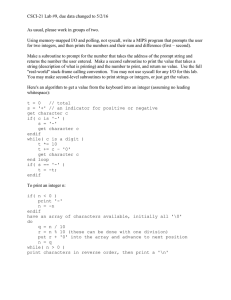
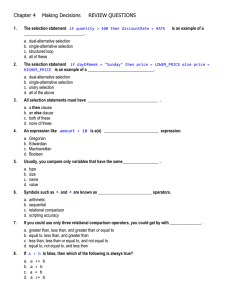
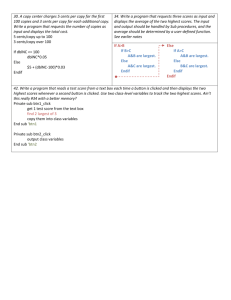
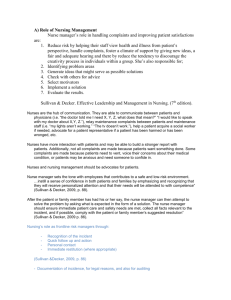
![procedure SumOfSubsets(A[0:n * 1],Sum,X[0:n])](http://s3.studylib.net/store/data/007635889_2-3e56f5cfefbd576d3b1ed785ac704b8b-300x300.png)
